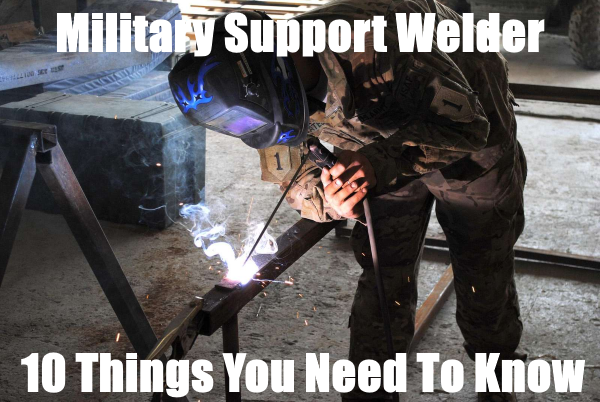Are you interested in becoming a support welder for the military?
Military support welders are essential to the daily operations of the U.S. Armed Forces.
There are opportunities to earn consistent pay, work in different locations, and receive benefits.
Learn more about what it takes to become a military support welder, including the 10 things you need to know before applying for the first job.
Related Article – US Navy Hull Technician (HT): Career Profile
Table of Contents
10 Things to Know About Military Support Welder
In general, a military support welder fulfills the same duties as a traditional journeyman.
Support welders maintain and repair heavy machinery, including military aircraft.
Furthermore, the job duties (more information, below) may extend to include work on construction and maintenance productions.
Often, military bases and installations around the world are in need of high quality tradespeople.
Therefore, you can earn a decent salary and receive steady work being employed by Uncle Sam.
The U.S. Armed Forces generally classifies military support welders under the following designations:
- Special Armor Support Welders (SAWS)
- Military Armor Support Welders (MASW)
Military support welders are essential to the success of the U.S. Armed Forces and fulfill an important role.
While technically not service members, these employees support military operations as private contractors.
Are you interested in joining the military as a support welder?
There are 10 things you need to know before applying for your first job.
#1. Purpose
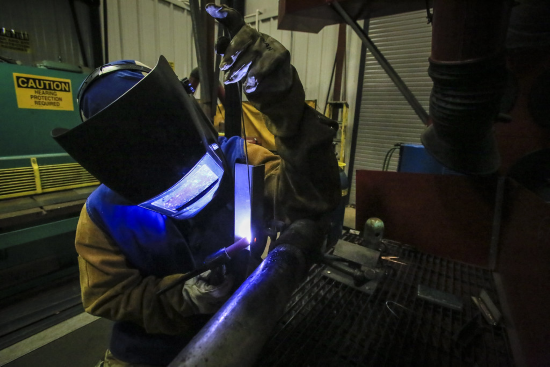
Military support welders are responsible for maintaining and repairing equipment on military installations.
For this reason, support welders generally focus on welding and fabricating metal parts and equipment associated with aircraft, vehicles, and ships.
Therefore, military support welders get the rare opportunity to specialize on expensive, highly advanced equipment.
There is a demand for highly skilled welders in all branches of the military.
As a result, military support welders can operate on everything from trucks and submarines to tanks and missiles.
Moreover, welders will handle all types of common metals (steel, aluminum, etc) along with specialty metals like titanium and silicon.
In general, the work of a military support welder is performed under the supervision of an officer, or maintenance supervisor.
Consequently, the tasks of a military support welder may vary yet the general duties include:
- Welding
- Cutting
- Brazing
- Forming
- Trimming
Furthermore, welders are sometimes assigned to other construction tasks such as performing vehicle and building maintenance or painting.
There are situations where a welder will perform the installation of armor plates, engine parts, or electrical wiring.
Accordingly, it doesn’t hurt to have familiarity with various hand and power tools (see, Job Skills).
Lastly, military support welders generally perform work outside in all types of conditions.
Therefore, you may perform welding tasks in trenches, elevated positions, or in confined areas.
It’s crucial to have the ability to work in a fast-paced environment as well as have the ability to follow instructions correctly.
#2. Job Skills
Military support welders are considered skilled craftsmen / tradespeople.
The work performance may impact the ability of a unit to successfully carry out a military operation.
Consequently, the U.S. Armed Forces seeks welders that offer a wide variety of skills.
Accordingly, the position requires advanced welding and fabrication skills.
Furthermore, it doesn’t hurt to have an overall knowledge of construction as well as experience in other types of trades.
In general, the military is seeking individuals that are capable of reading blueprints and following orders / instructions.
Secondly, military support welders need to work under pressure and in uncomfortable work conditions.
More importantly, working for the military will require someone to be flexible in terms of travel and being relocated.
Third, military support welders traditionally feature strong math skills and are detail-oriented.
You must be able to analyze complex problems and draw sound conclusions, resulting in resolving issues.
Military support welders regularly test, inspect, maintenance, and repair a variety of equipment and military infrastructure.
For this reason, in any environment, one must always practice caution and safe work practices.
Lastly, it never hurts to have computer skills and overall mechanical aptitude.
Individuals that lack experience but would like to become a support welder, can receive training (more details, below) or complete an apprenticeship program.
Since the position is competitive, those with previous welding experience have a distinct advantage when applying for a job (more information, below).
#3. Qualifications
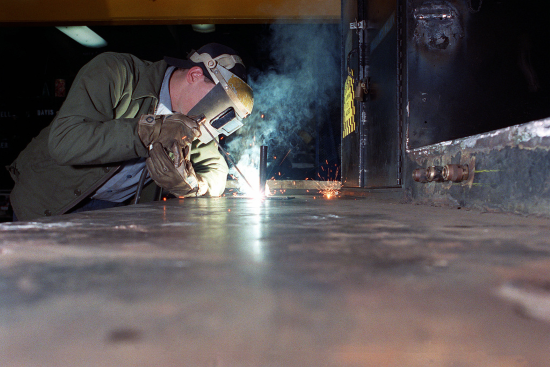
In general, when someone joins the military, they must meet certain qualifications and training requirements before advancement.
The same could be said for the position of a military support welder yet there are far fewer requirements.
First, the role of a military support welder is only open to individuals over the age of 18.
Secondly, the military requires applicants to have a high school diploma or GED equivalent.
Third, applicants must successfully pass a welding safety and performance test (more information, below).
It’s been previously highlighted the importance of being able to read and interpret blueprints.
Indeed, there is nothing that will distinguish you quicker as an amateur then struggling to read blueprints.
For this reason, if you lack the proper experience, there are several ways you can attain it through school or training.
Often, military support welders have previously completed a welding program at a trade school or community college.
Completing an apprenticeship program only highlights your skills and builds more experience.
As a result, you may want to consider earning certification from the American Welding Society (AWS).
The 2-step certification process requires individuals to pass a written exam and perform a welding test.
#4. How to Become a Military Support Welder
Do you want to serve the country as a military support welder?
The opportunity provides consistent pay as well as the ability to travel and see other parts of the country / world.
However, before you get too far, you’ll need to make sure you take the proper steps to become a military support welder:
- Meet basic requirements (18+ and high school diploma).
- Gain experience (on the job, trade school, community college, apprenticeship).
- Complete a welding safety certification.
- Receive a welding license from American Welding Society (AWS).
- Build resume and begin applying for jobs.
It’s time to start searching for jobs after you receive the proper training and certification.
Where can you find openings for a military support welder?
First, don’t hesitate to reach out to the nearest military recruiting office or military installation for more information.
Secondly, military support jobs are listed on job sites like Indeed and Monster.com.
#5. Military Support Welder Training
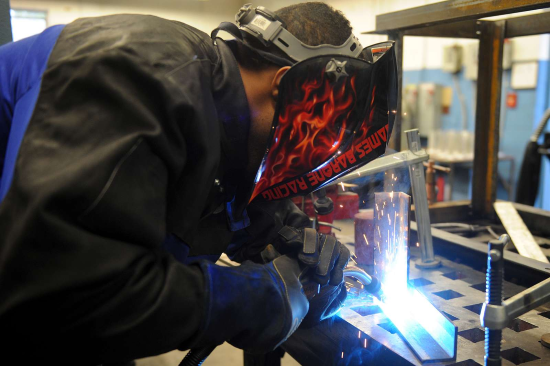
Do you want to become a military support welder but lack the knowledge and experience?
There is no need to worry as many others have been in the same predicament and are now employed by the U.S. Armed Forces.
For starters, there are several ways to attain the skills and knowledge you need to work as an expert welder:
- Trade School / Welding School
- Community College
- American Welding Society
Often, the journey to becoming a journeyman welder begins at a trade school or community college.
These 2 types of institutions both offer similar types of training to become a welder.
Welding School
Welding schools make the most sense since they focus specifically on the trade and you can gain an expertise in one area of fabrication.
The hands-on training is second to none and usually these schools have a lot of resources for gaining employment.
Furthermore, welding schools range in length from 1-4 years depending on the program.
Community College
Community colleges, on the other hand, also offer the opportunity to become a welder.
In fact, earning an associates degree may give you a major edge over the rest of the applicants.
Regardless of your path for training, make sure that the program you enroll in is accredited.
These programs are approved by the American Welders Society (AWS) and also lead to state accreditation.
What’s fantastic about community colleges and trade schools is there are not a lot of requirements for admission.
In general, all you need is a high school diploma or GED to get accepted into a welding program, regardless of your grades in high school.
Finally, the last option is to bypass formal training and test for certification with the AWS.
American Welding Society (AWS)
The American Welding Society provides the exam which consists of two parts:
- Level 1: Basic Welding Concepts
- Level 2: Specialized Welding Concepts
The AWS test is usually available to complete at welding schools and community colleges.
It covers advanced welding techniques such as flux cored welding, gas metal arc welding, and shielded metal arc welding.
You’ll also want to freshen up on blueprints, techniques, and welding terminology.
Those that elect to bypass formal training must have at least 3 years of welding experience to qualify for the exam.
Additionally, you must already have some type of welding certification (state / specialty certification).
#6. Advantages / Disadvantages
There are several benefits to becoming a military support welder.
For starters, the career is in high demand and pays well if you are willing to undergo the training.
More importantly, the career field is anticipated to grow 6% over the next decade.
Thus, welders should have little trouble finding employment with the military so long as they complete the proper requirements.
Military support welders typically earn a good salary (more details, below).
Additionally, it’s an outstanding opportunity to see other parts of the country and give back to the nation you serve.
Unfortunately, there are also a few disadvantages to consider.
For example, an individual with a family may not want the same travel and odd hours as someone that is single.
Moreover, the work is demanding and challenging.
Plus, military support welders work in harsh conditions and in any type of environment.
The hectic, fast-paced lifestyle of the military may not be for everyone.
Military support welders perform work duties under high temperatures using hot metals.
For this reason, there is the constant threat of danger or injury.
Support welders are frequently exposed to harmful chemicals, fumes, and loud noise levels.
Consequently, the pressure to get a job done on time (and correctly) is significant.
Nonetheless, if you believe you have what it takes, then you’ll likely find the work of a military support welder rewarding regardless of the disadvantages.
#7. Network with Military Personnel
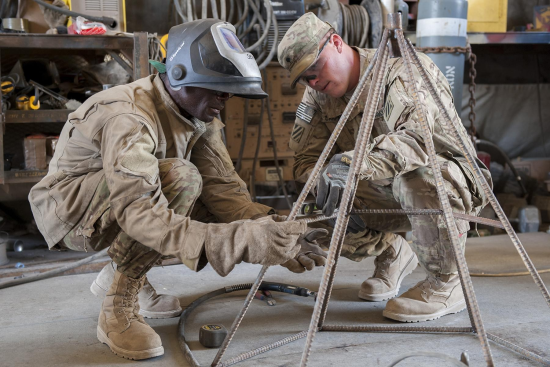
Did you know that it also helps to network with military personnel?
It’s true, any occupation or role that incorporates the military also makes it important to fraternize.
Therefore, also set aside the time to develop relationships with service members.
Military personnel can not only enlighten you on the lifestyle and culture of the U.S. Armed Forces, but also what it takes to succeed.
Furthermore, networking presents you with an edge when applying for employment.
It’s remarkable that who you know may just lead to a connection which leads to a job opportunity.
Thus, don’t be afraid to reach out and get involved with the military, even if you do not serve the country directly.
There are a variety of ways civilians with no military experience can get involved:
- Attend military functions and network.
- Volunteer for military activities and organizations.
- Join military organizations to fraternize.
- Reach out to a local recruiting office.
Did you know that welders are not the only civilian position in the military?
The military also employs carpenters, electricians, plumbers, and mechanics.
As a result, you never know who you’ll meet until you start networking at military events.
#8. Military Support Welder Pay / Salary
There is no question that individuals can earn a really good salary with the military.
On average, military support welders receive compensation based on the region and type of job.
Currently, the most lucrative opportunities for military welders exist back East and in southern California.
However, that does periodically change based on demand and the needs of the U.S. government.
In general, military support welders earn between $50,000 – $75,000 per year.
Notwithstanding, skilled and expert welders can easily earn closer to $100,000 a year, especially after gaining some experience.
The typical military support welder receives $23 per hour yet the rate is usually determined by what you service.
For example, a welder operating on a tank may earn $18 an hour, while another welder receives $25 per hour for servicing an aircraft carrier.
Per day, that provides a base pay of approximately $185 – $200, according to the Bureau of Labor Statistics.
Thus, weekly earnings range vastly from $900 – $2,000 per week.
The amount of pay will also depend on the number of hours work as overtime is very plausible.
Regardless of your career path, military support welders earn approximately 14% more than civilian welder occupations.
#9. Military Support Welder Job Prospects
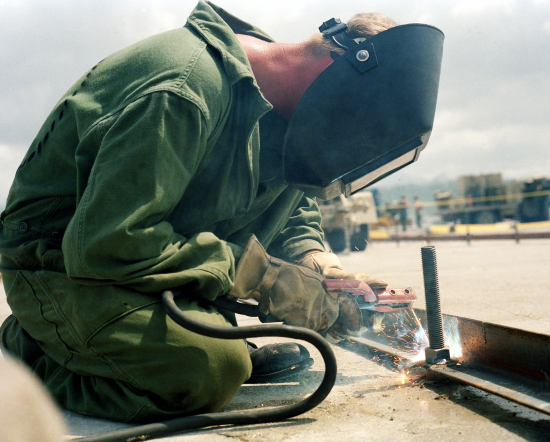
The job outlook for military support welders is very strong.
Currently, the forecasts predict that support welders for the military will only grow over the next decade (by 6% or more).
Furthermore, there are several paths to becoming a military support welder.
While positions are competitive, there are multiple ways to receive training and experience.
Thus, an individual can attend a trade school or community college, as well as gain direct welding experience through an apprenticeship.
The latter, an apprenticeship program, enables a trainee to develop his or her skills under the tutelage of a journeyman welder.
Moreover, these types of apprenticeship programs generally last 2-4 years so you can really expand your knowledge and skills.
It’s also important to practice communication and interpersonal skills since that serves well in any career path.
Military support welders are capable of working independently or with a team.
Regardless, you must have the ability to work alone, read blueprints, and follow directions closely.
The margin for error is very slim in the military which makes attention to detail crucial.
Be that as it may, those that are willing to learn and work hard can absolutely thrive as welders for the military.
#10. Apply for Military Support Welder Jobs
Do you meet the requirements to become a military support welder?
Have you completed the proper training and certification?
If so, then it’s time to begin applying for new jobs.
First, you’ll want to network with military personnel as well as build a good resume.
The resume is critical to getting the attention of prospective employers.
Then, it’s about mastering the interview after your resume gets their attention.
You should consider a resume like making a first appearance – you want to make an impression.
The resume should highlight your qualifications, including certification you have received.
Additionally, make sure to include any relevant training or education.
Job openings for military support welder are generally filled through a traditional application process.
There are some positions that require a welding specialty or expertise so make sure to read the job vacancy carefully.
A local community college or welding school will have more information about job prospects, as well as online job sites.
Lastly, you can also stop by a local Armed Forces recruiting office for inquires.
Conclusion
You do not have to take an oath to serve the country.
The U.S. Armed Forces employs many individuals that are not uniformed service members.
Often, trade jobs like electricians and plumbers are contracted out to private companies which, then, support military operations.
As such, becoming a military support welder is a phenomenal way to serve the country and earn good pay.
You’ll work on highly sophisticated and advanced military equipment including aircraft, tanks, and submarines.
Support welder positions are in high demand so don’t hesitate to pursue one as the job outlook is very strong.
Featured Image – GetArchive.net
- Replacing Dog Tags: 6 Things You Need to Know - June 28, 2024
- Navy OAR Test Study Guide - June 24, 2024
- 10 Best Sniper Movies of all Time - June 20, 2024
Originally posted on November 23, 2022 @ 6:04 pm
Affiliate Disclosure: This post may contain affiliate links. If you click and purchase, I may receive a small commission at no extra cost to you. I only recommend products I have personally vetted. Learn more.
